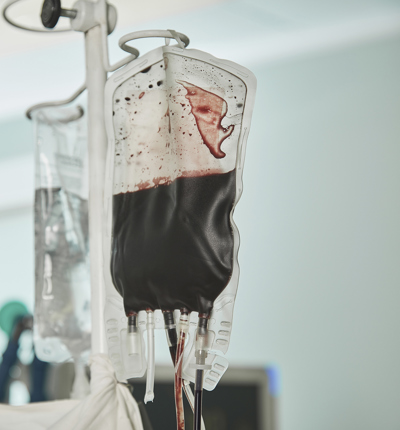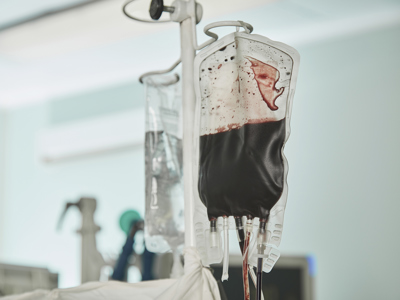
Infected Blood Compensation Scheme report is an opportunity to rebuild trust with the infected blood community
Leigh Day lawyers have welcomed the recommendations of the Infected Blood Inquiry over the Infected Blood Compensation Scheme.
Posted on 09 July 2025
They say it presents an opportunity to rebuild trust with the infected blood community, to be transparent and inclusive going forward. Human rights team partner Gene Matthews says it is time for the infected and affected to be put at the heart of the scheme as they should have been from the outset.
The Additional Report into the compensation scheme was published following additional hearings of the Infected Blood Inquiry to which Leigh Day was asked to provide evidence.
The Additional Report recommended, amongst others:
- The Scheme is open for registration to any individuals who may be eligible for compensation with forms available to complete the application with minimum information or in full.
- IBCA adopt more of a structured response to contributions from people infected and affected about how the Scheme is run.
- Government and IBCA should establish a mechanism by which individuals or organisations may raise concerns which arise with any aspect of the scheme.
- Adopt a scheme of prioritisation for the different cohorts within the community (including estates, those infected but who have never received compensation and affected) which can be objectively applied and is easily understandable. Importantly, the progress of this prioritisation occurs in parallel, not sequentially.
- IBCA should publish policy documents or guidance relating to the approach to severity bandings for those infected with Hepatitis.
- The Government reconsider its rejection of the Expert Advisory’s Group advice, which they had originally accepted, that the Special Category Mechanism payments via the existing support schemes (or the devolved equivalents) is included as one of the six health impact groups under the severe health condition award.
- Individuals who have received interferon treatment are awarded compensation under the level 3 severity banding.
- The deduction of the financial loss award post 2009 and 2017 for those who were infected with Hepatitis should not apply for individuals whose health is still impacted after these dates or where it remained difficult to obtain work.
- The Minister should consider whether a supplementary route for affected is appropriate, including severe psychological harm,
The cut-off date for the existing support schemes of 31 March 2025 is reviewed and that payments to bereaved partners after this date are reinstated until such time as they receive compensation.
The scheme was initially announced in May 2024, when the Government set out proposals for how compensation would be calculated, after the publication of the Infected Blood Inquiry’s main report.
According to Press Association, more than 30,000 people in the UK were infected with HIV, hepatitis B and hepatitis C after they were given contaminated blood and blood products between the 1970s and early 1990s.
Some £11.8 billion has been allocated to compensate victims, administered by the IBCA.
As of July 1, some 2,043 people have been asked to make a claim, and 460 people have had their compensation paid totalling more than £326 million, according to IBCA figures.
Ahead of the publication of the report, the Cabinet Office said that it will “reduce the administration and process delays” victims are facing, meaning the IBCA will “be able to deliver services quickly, and require different supporting information from claimants”.
Leigh Day represents more than 500 people infected and affected by the infected blood scandal.
Following the publication of Sir Brian Langstaff’s Additional Report into the Infected Blood Compensation Scheme, Leigh Day partner Gene Matthews, who represents victims of the infected blood scandal in their applications for compensation, issued a statement:
Leigh Day partner Gene Matthews said:
“We welcome the Additional Report on Compensation published by the Infected Blood Inquiry. It goes a long way to address the issues that our clients have highlighted and which we passed to Sir Brian in the evidence we gave in the further hearings. We hope the Cabinet Office and the Government accept those recommendations and take immediate steps to ensure the infected and affected communities are properly compensated for what happened to them.
“Sir Brian’s findings echo the concerns which have been raised repeatedly by our clients. The Government and IBCA have an opportunity to rebuild trust with the community, to be transparent and inclusive going forward. It is time for the infected and affected to be put at the heart of the scheme as they should have been from the outset.”

Gene Matthews
Gene specialises in consumer law, product liability and data protection claims mainly brought as group claims/ multi-party actions

Beatrice Morgan
Beatrice Morgan is a senior associate solicitor in the human rights department.

Woman given hepatitis C during infected blood scandal launches legal challenge over “unfair and discriminatory” compensation scheme
A woman who contracted hepatitis C during the infected blood scandal has launched a legal challenge to the government’s new Infected Blood Compensation Scheme, which she says unfairly discriminates against people with the virus.

